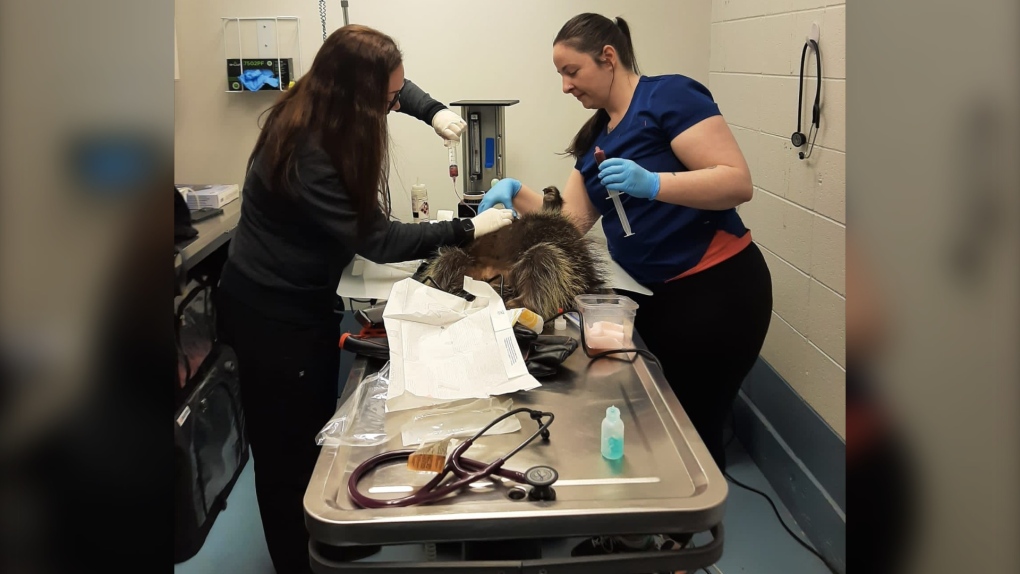'Stars all lined up perfectly': Edmonton wildlife rescue performs rare porcupine blood transfusion
Officials at a wildlife rescue and a rehabilitation centre in Edmonton believe they've performed the first successful porcupine blood transfusion in North America.
Several months ago, two injured female porcupines came into WILDNorth's care for different reasons. The larger one was attacked by a dog while the smaller one was described as "lethargic."
"We came to the conclusion that the smaller of the two porcupines was very, very ill, actually on its deathbed and the only way to save its life was to perform a blood transfusion," said Dale Gienow, executive director of WILDNorth.
Once the larger porcupine was stabilized and healed from its wounds, it became the donor for the smaller porcupine. The transfusion happened two weeks ago.
"We’re seeing her come full circle, a complete 180 [degrees]. She's now active, she's starting to climb, she's eating well on her own, all those things, so we’re very optimistic about her," Gienow said.
On Monday, the larger porcupine was released back into the wild where it was originally found, a full circle moment for Gienow who initially rescued it.
"It was a difficult rescue, this one's got a lot of attitude. She’s got lots of perseverance but now that it’s healed up again, we're excited to get her back into the wild where it belongs," he said.
THE PERFECT MATCH
Daren Mandrusiak with the Harvest Pointe Animal Hospital said to his knowledge, a blood transfusion between porcupines hasn’t been published in a medical journal or done before for several reasons.
"To find an individual porcupine who needs a blood transfusion is already rare enough, then to find one where you actually have a healthy blood donor like that is exceedingly rare," Mandrusiak told CTV News Edmonton.
Mandrusiak says the blood transfusion wouldn’t impact the larger porcupine's health and its opportunity of being released back where it was found.
 Staff at Harvest Pointe Animal Hospital perform a blood transfusion on a porcupine. (Credit: WILDNorth)
Staff at Harvest Pointe Animal Hospital perform a blood transfusion on a porcupine. (Credit: WILDNorth)
"The stars all lined up perfectly to allow this to happen for this little porcupine."
Mandrusiak says blood transfusions for animals are quite common but not in wildlife medicine because it can take a lot of resources, specific training and a donor which isn’t easy to come by.
There currently isn’t any information or research on blood physiology in porcupines, according to Mandrusiak.
Prior to the transfusion, cross matching was done to see if there would be any transfusion reaction as several things could go wrong.
"We could not be able to collect blood on the big porcupine … they have to be sedated. Getting such a large volume without having it clot is quite difficult," Mandrusiak said.
Gienow said the smaller porcupine will be staying in WILDNorth’s care for the next couple of weeks to monitor her health before they release her.
The rescue centre along with Harvest Pointe Animal Hospital plans to publish their work to a wildlife medical journal so the work is out there for others.
"Whether I’ll have a chance to do it again? Probably not. But I hope so, and if the opportunity ever comes I’ll know that it’s possible," Mandrusiak said.
CTVNews.ca Top Stories

'It could be catastrophic': Woman says natural supplement contained hidden painkiller drug
A Manitoba woman thought she found a miracle natural supplement, but said a hidden ingredient wreaked havoc on her health.
After hearing thousands of last words, this hospital chaplain has advice for the living
Hospital chaplain J.S. Park opens up about death, grief and hearing thousands of last words, and shares his advice for the living.
WHO likely to issue wider alert on contaminated cough syrup
The World Health Organization is likely to issue a wider warning about contaminated Johnson and Johnson-made children's cough syrup found in Nigeria last week, it said in an email.
WATCH Video shows dramatic police takedown of carjacking suspects chased through parking lot north of Toronto
Police have released video footage of a dramatic takedown of a group of teens wanted in connection with an attempted carjacking in Markham earlier this month.
Canada, G7 urge 'all parties' to de-escalate in growing Mideast conflict
Canada called for 'all parties' to de-escalate rising tensions in the Mideast following an apparent Israeli drone attack against Iran overnight.
'It was all my savings': Ontario woman loses $15K to fake Walmart job scam
A woman who recently moved to Canada from India was searching for a job when she got caught in an online job scam and lost $15,000.
Families to receive Canada Child Benefit payment on Friday
More money will land in the pockets of some Canadian families on Friday for the latest Canada Child Benefit installment.
After COVID, WHO defines disease spread 'through air'
The World Health Organization and around 500 experts have agreed for the first time on what it means for a disease to spread through the air, in a bid to avoid the confusion early in the COVID-19 pandemic that some scientists have said cost lives.
American millionaire Jonathan Lehrer denied bail after being charged with killing Canadian couple
American millionaire Jonathan Lehrer, one of two men charged in the killings of a Canadian couple in Dominica, has been denied bail.































